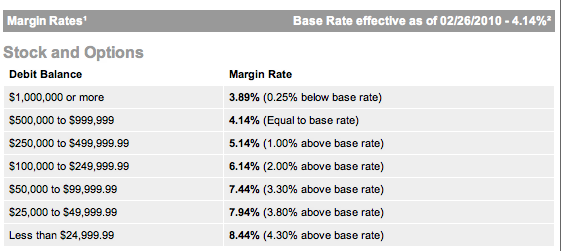Why can’t everyone be like the big man? Year after year of quiet excellence, and no desire to share his personality with the world at large. Consistency and aptitude still count for something, right?
We could give a damn who wins the NBA title; not that we’re not fans, rather that we have no emotional investment nor rooting interest in something that only tangentially affects us. But it’s hard not to pull for the stoic giant who forever redefined the power forward position. Would that everyone on the planet knew what they were good at, and didn’t waste their time trying to be something else. Besides, he could use one more ring for the thumb.
There are blog carnivals. There are personal finance blog carnivals, and most of them are horrible. Cut, paste, present. You can read one of those if you want – it won’t take long – or you can stay here and at least be entertained and possibly learn something. Doesn’t that sound better? Of course it does.
The Carnival of Wealth. A week’s worth of posts from around the personal finance realm. Some are great, some are not. None are average, or they wouldn’t be here. Submitters, go here. Readers, sit back and ingest:
Week after week, Ken Faulkenberry of AAAMP Blog has an uncanny ability to submit his post seconds before we decide we’re going to start writing the CoW. That’s why he’s usually at the top, and remains so this week. Ken argues that you do well in a bear market by losing less than everyone else does. That isn’t technically true, but his point is undeniable – understand the difference between a secular bear market and a cyclical bear market. You can start by guessing which we’re in now.
Here’s an example of what not to submit to the CoW. It’s someone’s middle school essay on investing in oil and gas. Someone going by the name “Lynn Jackson”, writing at One Cent At A Time. “Lynn” explains what you need to do before buying shares of, say, ExxonMobil:
You will be faced with evaluating different companies for their experiences, success rates, and their fits with your needs.
Using “needs” as a noun, -1 point. “Lynn” continues:
In turn, these companies will want to get a lot of information about you to assess your suitability. You will need to work with a lawyer, because this weight of investment requires a considerable amount of regulation and compliance.
Huh? A post written for the most novice of investors, claiming that a company you’re interested in buying a piece of will keep a dossier on you? There were 2 comments on this post last we checked, and neither commenter challenged “Lynn” on this falsehood. If you’re looking to do a hostile takeover, then yeah, this post might be valuable to you if you can get past the unspeakable liberties “Lynn” is taking with the English language. “Lynn”, we’re trying to delight readers, not scare them away.
Good Lord. Speaking of middle schoolers, this next one opens with the last resort of every 12-year-old who has a report due Monday morning and it’s now Sunday night: a dictionary definition!
Purpose – what does this word mean to you?
The dictionary defines purpose as ‘The reason for which something is done or created or for which something exists’
That’s from Savvy Scot. Have at it.
Someone at UPromise wrote an advertorial for Jason at One Money Design, and allowed him to put his name on it. Or maybe he really did write it himself. No way to prove it. Either way, he got paid. Oh, did we forget the link? Oops. Remind us to go back and insert it.
Does anybody proofread anymore? We’re not talking about an occasional typo slipping through. We’re talking about a post so replete with errors that it makes us want to find the college admissions officer who greenlit the submitter’s application and give her a Breathalyzer test. Sean at One Smart Dollar lists (bloggers love lists) 8 jobs that don’t require a degree. The funniest part of this post is that out of the millions of college dropouts who went on to wealthy and productive lives, the 2 Sean cites by name are Mark Zuckerberg and…Ryan Seacrest. Yes, with the right brand of hair gel and sufficient shiny teeth, you too can be a barely closeted no-talent. But don’t despair, because
While college can cost thousands of dollar, the cost to take a few classes to before a real estate broker is much less.
Read that aloud for full effect.
Keep in mind that being a real estate broker is not a 9-5 type of job.
Fine as far as it goes, but he follows that up with a Control Your Cash favorite – the utterly superfluous sentence:
Real estate brokers often work nights and weekends.
If you don’t read your own stuff, why should the rest of us?
(A post titled “How Many Keywords Should You Run On A Page?” Yeah, we can’t wait to run that.)
Did we run a submission last week on checking your credit score? You mean we missed a week? That won’t do. If the most overwritten topic in personal finance is “creating your emergency fund”, “checking your credit report” is a close second. We’ll let Squeezer at PF Success handle it from Oh God, we don’t even have it in us to write interesting comments on the inanity of this particular repetitive blog topic anymore.
Should we just tank at this point? If we run the worst carnival on the internet, do we get the 1st pick in next year’s carnival draft? Let’s try.
Complex Search lists 10 reasons the housing market won’t recover anytime soon. Most of the reasons are valid, even though the post is wildly self-contradictory. Opening line:
We’re all pulling for the housing market to recover.
Start of the next paragraph:
If you’re considering buying a home because you want to live in it for 30 years, this market is perfect for you.
So we’re not “all” pulling for the housing market to recover. Some of us want prices to stay low. You just said as much! Even better, this post was written by John Haller, the self-proclaimed founder of Fidelity One Credit Corp, “a socially responsible company.”
“We’re socially responsible” is like “I have a great sense of humor.” If you have to say it…
Socially responsible? Guess what Fidelity One specializes in. Car title loans! You can’t make this up.
At least one person’s going to send us an email this week saying, “Why do you have to be so critical?”, to which we’ll respond, “Click on the links in the CoW.”
And just like that, PKamp3 from DQYDJ.net has to come in and ruin everything. Original topic? Check. Readable English? Check. A little humor and lots of expertise? Check. And he slew at least one dragon of conventional wisdom, too. PKamp3 says you can’t look at a stagnant market level over a certain period and say you’d have been better off keeping your money in a mattress. Why? Because dividend reinvesting, that’s why. PKamp3 backs up his points with irrefutable data, too. Damn him. And we were doing so badly, too.
What’s this? Another good post? Now you’re just rubbing it in. Stephanie at Nerd Wallet shoots down a gimmick from C1 Bank. Buy a CD, get a Mercedes. Of course there’s a catch, and of course the smart folks at Nerd Wallet are happy to bring it to your attention. This post is so comparatively good, we’re not even going to point out the tired “car loses value the moment you drive it off the lot” mantra.
(sigh) From Liana Arnold at CardHub, an honest and critical review of the 3 latest travel rewards cards from Bank of America. Again, rewards are everything. Credit limit is close to everything. Interest rate is nothing. (Not “interest rate is zero”, but “interest rate is nothing.” Download our book if you think that’s a distinction without a difference.)
Now we’re in danger of squeaking into the playoffs.
And again. John Kiernan at Wallet Blog wants you to just buy a freaking house already, alright? Mortgage rates have a lower bound (zero). They’re rapidly approaching it. God, the universe, John Kiernan and the Control Your Cash principals all want you to buy a house. Just do it.
Andrew at 101 Centavos is back. He embodies all the traits we love here at Control Your Cash: strong opinions, original research, the ability to write without stultifying…he’s basically the opposite of a mommy blogger. This week he writes about institutional investors’ reluctance to include Walmart in their portfolios.
Did you know that only 31% of Walmart stock is held by institutional investors? You didn’t, and you probably don’t know what to make of that number because it’s meaningless without a frame of reference. According to Andrew, 60-80% of a typical stock that trades on the New York Stock Exchange is held by institutional investors. So we figured that maybe Walmart’s low number is a result of the company’s enormous market capitalization: there’s so much Walmart to go around that Ma and Pa Investor can’t help but own 70% of it. Andrew proves that that’s not the case, and explains why brokerage houses are largely insane.
(Seven Essential Navigation Tips for New Boat Owners? From something called BoatInsurance.org? That’s more like it.)
On balance, that was awful. Here’s your money back. The good news is we’re on Investopedia, all the freaking time. And you can follow us on Twitter (@CYCash). And we’ll have something of our own creation here on Wednesday. Stay tuned.





